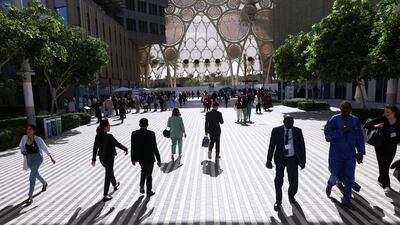The recent meeting between US President Joe Biden and Chinese President Xi Jinping in San Francisco was described to me by one observer as the moment when the two countries marked the bottom for their fractured relationship.
The thinking behind this analysis is there is now an acknowledgment from both sides that they cannot do without each other, as they chart a better growth path for the world’s two largest economies. The hope is that from here tensions will not dramatically increase and there is a chance that things could even improve.
A cycle is drawing to a close then. For decades, globalisation was the glue that ensured the US and China did their utmost to keep the trade and commerce train on the tracks. In recent years, this stickiness has been weakening as supply chains are redrawn on regional lines and protectionist and populist policies have become widespread.

The Covid-19 pandemic only accelerated what would have been inevitable in the 21st century – one that was billed as the “Chinese Century” – namely that the growing competition between the US and China would eventually break the system that propelled them to a period of unprecedented wealth generation.
What now? The rivalry between the two countries will not suddenly abate, but the shifting world map of business has opened up. Many more countries see their chance to rise. The transitions we are witnessing amid climate change, technological advances and higher interest rates are shaping a new world order.
Into this maelstrom, emerging nations such as the UAE and its Gulf neighbours are showing their credentials.
Talent and capital are being increasingly drawn to this region and away from traditional economic centres. Doing business in Europe and the US has become harder than it should be, thanks to the unbearable toxicity of their political landscapes. Meanwhile, their quality of life seems to be stagnating.
Arguably, it is now more straightforward to hire the people you need and bring them to the UAE than to recruit them in countries where working-age populations are shrinking and the barriers to foreign talent are getting thicker.
The Gulf region is proving more successful at increasing levels of access to quality education, affordable health care and individual economic opportunity for the many professionals who live here. Spurring innovation is a priority too. It is difficult to argue any of these is true in the UK and the US.
The projects, businesses and institutions in this region offer exciting and dynamic opportunities for young professionals. Geography plays an important role also, with the fast-growing markets of Asia and Africa close by. It is a compelling formula.
A successful Cop28 global climate conference will also remind people around the world that this is a region that is both immediately affected by climate change and actively seeking solutions. And it is here where you can be part of what is seen as a collaborative journey to meet the biggest challenge of our times. Elsewhere, you are often pressured to choose between sides in what is being framed as a war.
We also understand what a real war looks like. Thus, we realise how important it is to find the perspective to meet the challenge of climate change in a constructive and productive manner.
The dominance of American technology companies that have more scale and power than even the country they emerged from has gone largely unchecked. They have eroded the ability of governments to effectively govern, as they reach across borders at will and operate with far more information and in real-time. In this context, maximum profit wins out every time. It seems as if the Gulf economies have to a greater extent been able to shield its population from the worst of this reality.
Should the Gulf remain on this upward trajectory, what it offers will, of course, eventually surpass what is available in the West in almost every sense.
Why then would anyone with aspirations to improve their lives not choose to come to the Gulf compared to what is in their home countries?
This remarkable trend will soon represent fierce competition, and perhaps, the beginnings of an “Arab Century”.


